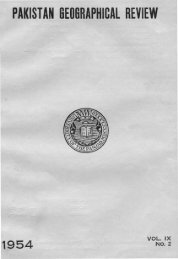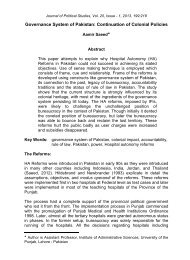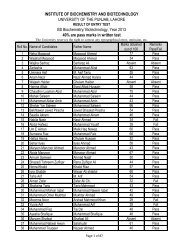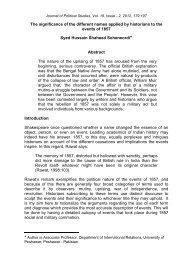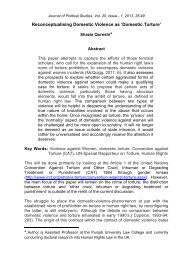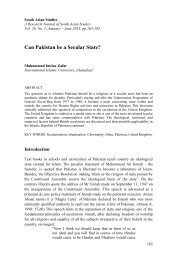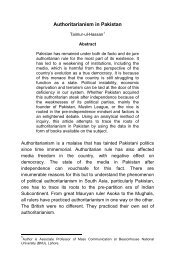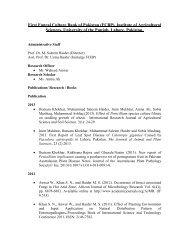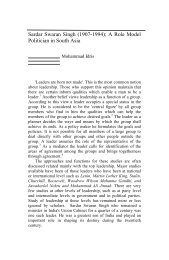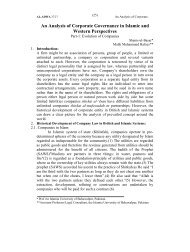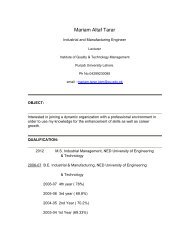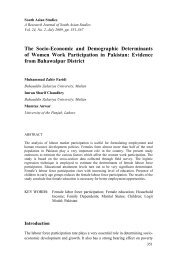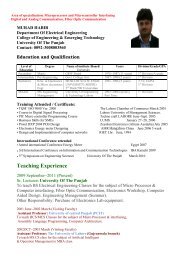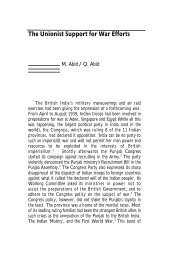Power Relations in Research by Tahira Jabeen - University of the ...
Power Relations in Research by Tahira Jabeen - University of the ...
Power Relations in Research by Tahira Jabeen - University of the ...
You also want an ePaper? Increase the reach of your titles
YUMPU automatically turns print PDFs into web optimized ePapers that Google loves.
Journal <strong>of</strong> Political Studies, Vol. 20, Issue - 1, 2013, 219:233<br />
Study<strong>in</strong>g Political Elite <strong>in</strong> Pakistan: <strong>Power</strong> <strong>Relations</strong> <strong>in</strong> <strong>Research</strong><br />
<strong>Tahira</strong> <strong>Jabeen</strong> ♣<br />
Abstract<br />
This article details <strong>the</strong> ethical, social and political dilemmas<br />
that a researcher has to face <strong>in</strong> study<strong>in</strong>g <strong>the</strong> political elite. It is<br />
argued that <strong>the</strong> all too common assumption about <strong>the</strong><br />
vulnerability, thus need to protection, <strong>of</strong> research participants<br />
does not hold true <strong>in</strong> research with powerful political elite.<br />
Political elite have powers to determ<strong>in</strong>e, among o<strong>the</strong>r th<strong>in</strong>gs,<br />
some fundamental research processes such as who studies<br />
<strong>the</strong>m, how <strong>the</strong>y are studied and for how long, render<strong>in</strong>g <strong>the</strong><br />
researcher vulnerable <strong>in</strong> <strong>the</strong> researcher-researched<br />
relationship. It is suggested that <strong>the</strong> standard research method<br />
courses and research ethics protocols need to take <strong>in</strong>to<br />
account and adapt to this reversal <strong>of</strong> power relationship.<br />
Key words: Political elite, research ethics, research participants, power<br />
relations, researcher’s vulnerability<br />
Introduction<br />
A considerable shift has occurred <strong>in</strong> research community attitudes towards <strong>the</strong><br />
report<strong>in</strong>g <strong>of</strong> field experience. We have come a long way from, when it was<br />
considered ‘narcissistic’, ‘self-<strong>in</strong>dulgent’ and a ‘contam<strong>in</strong>ation <strong>of</strong> data’ (Punch<br />
1986, p.14) to talk one’s field experience. These days, shar<strong>in</strong>g one’s<br />
experience is considered to be ‘academic self reflection’ (Gallaher 2009,<br />
p.136) <strong>in</strong> which ‘reflexivity’ has become a part <strong>of</strong> <strong>the</strong> analysis (Denz<strong>in</strong> &<br />
L<strong>in</strong>coln 2005; L<strong>in</strong>coln & Guba 1985). However, <strong>the</strong>re are always those, who,<br />
on <strong>the</strong> basis <strong>of</strong> <strong>the</strong>ir experience, argue that <strong>the</strong>re is cont<strong>in</strong>u<strong>in</strong>g paucity <strong>in</strong> social<br />
science research on practical challenges and dilemmas that <strong>in</strong>evitably arise <strong>in</strong><br />
<strong>the</strong> field, particularly <strong>in</strong> a difficult and unstable context (K<strong>in</strong>g 2009; Lee 1995;<br />
Punch 1986). Often, researchers are left to <strong>the</strong>ir own sensibilities and skills to<br />
resolve <strong>the</strong>se challenges. The codes <strong>of</strong> ethics and guidel<strong>in</strong>es <strong>of</strong><br />
research/academic <strong>in</strong>stitutions, <strong>in</strong> <strong>the</strong> words <strong>of</strong> John K<strong>in</strong>g, ‘almost always fall<br />
short <strong>in</strong> help<strong>in</strong>g <strong>the</strong> researcher successfully navigate unanticipated ethical,<br />
social and political challenges <strong>in</strong> <strong>the</strong> field’(K<strong>in</strong>g, 2009, p. 8). An analytical<br />
♣<br />
Author is Assistant Pr<strong>of</strong>essor, Social Work Department, <strong>University</strong> <strong>of</strong> <strong>the</strong> Punjab,<br />
Lahore - Pakistan
<strong>Tahira</strong> <strong>Jabeen</strong><br />
account <strong>of</strong> <strong>the</strong> pa<strong>in</strong>s and perils <strong>of</strong> conduct<strong>in</strong>g field research can serve to<br />
highlight ethical, social and political issues (Punch, 1986), help o<strong>the</strong>r aspir<strong>in</strong>g<br />
researchers avoid re<strong>in</strong>vent<strong>in</strong>g <strong>the</strong> wheel (Mertus, 2009) and, <strong>in</strong> <strong>the</strong> long run,<br />
may contribute to review and fur<strong>the</strong>r development <strong>of</strong> exist<strong>in</strong>g codes and<br />
research methods.<br />
In this article, I discuss <strong>the</strong> challenges and dilemmas related to ‘study<strong>in</strong>g<br />
powerful/elite’ <strong>in</strong> with<strong>in</strong> exist<strong>in</strong>g research ethics protocols developed from <strong>the</strong><br />
global ‘North’ perspective. I start with a short discussion <strong>of</strong> conduct<strong>in</strong>g<br />
research with ‘people <strong>in</strong> position <strong>of</strong> power and/ or elite’ <strong>in</strong> <strong>the</strong> first section. In<br />
<strong>the</strong> follow<strong>in</strong>g section, I <strong>in</strong>troduce <strong>the</strong> research project on which this article is<br />
based. The third and ma<strong>in</strong> section deals with practical issues <strong>in</strong>clud<strong>in</strong>g<br />
‘ethics’, ‘access’, ‘safety’ and ‘identity’ that I had to face while conduct<strong>in</strong>g<br />
research with Pakistani political elite. I conclude <strong>by</strong> reflect<strong>in</strong>g on my<br />
experiences and suggest<strong>in</strong>g how shar<strong>in</strong>g <strong>the</strong>se experiences could be useful<br />
for o<strong>the</strong>r researchers work<strong>in</strong>g with political elite <strong>in</strong> <strong>the</strong> global South.<br />
1. Study<strong>in</strong>g Elite<br />
Some forty years ago, <strong>in</strong> 1969, Laura Nader appealed to anthropologists to<br />
‘study up”, that is, to analyze <strong>the</strong> processes and <strong>in</strong>stitutions where<strong>by</strong> power<br />
and responsibilities are exercised <strong>in</strong> complex American society ra<strong>the</strong>r than<br />
adhere to traditional anthropological focus on far-flung exotic cultures and<br />
marg<strong>in</strong>alized populations (Nader, 1974). Her argument was that ‘<strong>the</strong> quality <strong>of</strong><br />
life and our lives may depend upon <strong>the</strong> extent to which citizens understand<br />
those who shape attitudes and actually control <strong>in</strong>stitutional structures’, that is<br />
political elite (Nader, 1974, p. 284). Many o<strong>the</strong>rs have contributed and<br />
encouraged fellow social scientists to spell out <strong>the</strong> processes <strong>of</strong> power and<br />
politics (Handyman, 2000; Marcus, 1992, 1999; Wolf, 1996; Wolf, 1974). From<br />
<strong>the</strong> political science and public policy perspective, Cyril Belshaw (1976),<br />
Ca<strong>the</strong>r<strong>in</strong>e Marshall (1984), Chris Shore and Susan Wright (1997) and Jan<strong>in</strong>e<br />
Wedel and colleagues (2005) considered analyses <strong>of</strong> powerful <strong>in</strong>stitutions and<br />
political elites <strong>the</strong> ma<strong>in</strong> focus <strong>of</strong> anthropology <strong>of</strong> policy and politics. However,<br />
<strong>the</strong> difficulty <strong>of</strong> study<strong>in</strong>g a powerful <strong>in</strong>stitution or elites, that is, people <strong>in</strong> high<br />
positions, who are literate, articulate, self conscious and with <strong>the</strong> power,<br />
resources and expertise to control <strong>in</strong>formation and protect <strong>the</strong>ir reputation is<br />
pa<strong>in</strong>fully obvious to many researchers (Gild<strong>in</strong>g, 2002; Marcus, 1992; Marshall,<br />
1984; Punch, 1986). In short, <strong>in</strong> <strong>the</strong> research context, while <strong>the</strong> powerless are<br />
those who cannot easily refuse to be researched (Skeggs, 1994), <strong>the</strong> powerful<br />
are those who can determ<strong>in</strong>e, among o<strong>the</strong>r th<strong>in</strong>gs, some fundamental<br />
research processes such as who studies <strong>the</strong>m, how <strong>the</strong>y are studied and for<br />
how long (Williams 1989). With such challenges regard<strong>in</strong>g research<br />
participants present, <strong>the</strong> task almost always becomes one marred with<br />
unanticipated practical and ethical dilemmas.<br />
220
Study<strong>in</strong>g Political Elite <strong>in</strong> Pakistan<br />
2. <strong>Research</strong> Context/Background and Introduction <strong>of</strong> <strong>the</strong> <strong>Research</strong><br />
Project<br />
To exam<strong>in</strong>e <strong>the</strong> broader research question, ‘how do policy makers <strong>in</strong> Pakistan<br />
conceptualize child protection? I used multi-methods <strong>of</strong> data ga<strong>the</strong>r<strong>in</strong>g. This<br />
article is based on <strong>the</strong> ethnographic fieldwork experience <strong>of</strong> my doctoral<br />
research <strong>in</strong>to child protection policy <strong>in</strong> Pakistan and focuses on <strong>the</strong> ethical and<br />
practical issues that arose while I was <strong>in</strong>terview<strong>in</strong>g political elite such as<br />
parliamentarians, sitt<strong>in</strong>g and former federal m<strong>in</strong>isters, department heads and<br />
senior bureaucrats. Some were based <strong>in</strong> <strong>the</strong> capital city-Islamabad, o<strong>the</strong>rs,<br />
especially those who were retired or not <strong>in</strong> <strong>the</strong> Parliament, were approached<br />
<strong>in</strong> <strong>the</strong>ir home towns all over <strong>the</strong> country.<br />
This fieldwork was carried out between January 2010 and August 2010. I was<br />
based <strong>in</strong> Lahore study<strong>in</strong>g newspaper archives <strong>in</strong> a public library <strong>in</strong> between<br />
<strong>in</strong>terview appo<strong>in</strong>tments <strong>in</strong> Islamabad and elsewhere. In Islamabad, m<strong>in</strong>istries<br />
and government departments were under high security. One could not enter<br />
<strong>the</strong> premises unless one had a confirmed appo<strong>in</strong>tment. In addition to <strong>the</strong> law<br />
and order and security issues, <strong>the</strong>re was an <strong>in</strong>creased sense <strong>of</strong> <strong>in</strong>stitutional<br />
breakdown. Government was seen as corrupt, un<strong>in</strong>terested and <strong>in</strong>effective <strong>in</strong><br />
deliver<strong>in</strong>g services and unaccountable to <strong>the</strong> masses (International Crisis<br />
Group, 2010; Transparency International Corruption Report, 2009). Above all,<br />
<strong>in</strong> Pakistan, <strong>the</strong>re are no national statements or standards for <strong>the</strong> ethical<br />
conduct <strong>of</strong> research (<strong>Jabeen</strong>, 2009).<br />
I conducted 26 <strong>in</strong>terviews (15 men, 9 women) <strong>in</strong> all, with sitt<strong>in</strong>g and former<br />
m<strong>in</strong>isters, parliamentarians, serv<strong>in</strong>g and retired bureaucrats and<br />
representatives <strong>of</strong> non-government national and <strong>in</strong>ternational organizations.<br />
Interviews were conducted <strong>in</strong> English, Urdu, and a mix <strong>of</strong> English and Urdu as<br />
<strong>the</strong> participants chose and took place <strong>in</strong> <strong>of</strong>fices, homes, federal parliamentary<br />
lodges and social clubs <strong>of</strong> <strong>the</strong> participants. Most participants were aged, some<br />
retired or at <strong>the</strong> highest level <strong>of</strong> <strong>the</strong>ir career; some were <strong>in</strong> late forties or early<br />
fifties. All <strong>in</strong>terviews resulted from a prior request for <strong>in</strong>terview, although some<br />
were confirmed at such short a notice that it allowed for only a few hours to<br />
reach <strong>the</strong> place.<br />
3. Issues faced dur<strong>in</strong>g <strong>the</strong> fieldwork<br />
In research, teach<strong>in</strong>g and publications, <strong>the</strong>re is a tendency to sell students an<br />
almost idealised model <strong>of</strong> <strong>the</strong> research which is neat, tidy, smooth and<br />
unproblematic. There is little mention <strong>of</strong> how <strong>the</strong> reality <strong>of</strong> field hazards is<br />
experienced, mostly ‘situationally, even spontaneously’ (Punch, 1986, p.13). It<br />
is edited out <strong>of</strong> social research <strong>the</strong>ory, method and ethics or <strong>the</strong>re rema<strong>in</strong>s<br />
<strong>in</strong>sufficient discussion <strong>of</strong> <strong>the</strong> practical and ethical issues faced <strong>by</strong> researchers,<br />
221
<strong>Tahira</strong> <strong>Jabeen</strong><br />
especially those conduct<strong>in</strong>g research <strong>in</strong> different (from <strong>the</strong> global North)<br />
context.<br />
3.1. Ethical issues<br />
In <strong>the</strong> wake <strong>of</strong> <strong>the</strong> Nuremburg trials, hardly anyone would claim all research as<br />
objective, neutral and beneficial. Today, we have <strong>the</strong> discipl<strong>in</strong>ary codes <strong>of</strong><br />
ethics and <strong>in</strong>stitutional review bodies to oversee <strong>the</strong> research process. These<br />
pr<strong>of</strong>essional codes <strong>of</strong> ethics tend to adopt <strong>the</strong> assumptions beh<strong>in</strong>d bio-medical<br />
research, which has <strong>of</strong>ten been performed on vulnerable <strong>in</strong>dividuals and<br />
groups, and are typically focused on protect<strong>in</strong>g <strong>the</strong> powerless researched<br />
(Gray, 1979; K<strong>in</strong>g, 2009; Wax, 1987). Based on my recent fieldwork, I share<br />
<strong>the</strong> concern and experience <strong>of</strong> <strong>the</strong> researchers, who, time and aga<strong>in</strong>, f<strong>in</strong>d<br />
<strong>the</strong>se codes narrowly focused, irrelevant, naïve or <strong>in</strong>sufficient to guide <strong>the</strong>ir<br />
actions through <strong>the</strong> different field condition with<strong>in</strong> which <strong>the</strong>y work (Gallaher,<br />
2009; Gallihar, 1980; Punch, 1986; Wax, 1980; Wedel, 2001). Be<strong>in</strong>g based <strong>in</strong><br />
a lead<strong>in</strong>g research university <strong>in</strong> Australia, I was follow<strong>in</strong>g <strong>the</strong> university’s<br />
Human Ethics policy and guidel<strong>in</strong>es based on <strong>the</strong> Australian Code for <strong>the</strong><br />
Responsible Conduct <strong>of</strong> <strong>Research</strong> (2007) and National Statement on Ethical<br />
Conduct <strong>in</strong> Human <strong>Research</strong> (2007), toge<strong>the</strong>r termed ‘<strong>the</strong> code’ from here on.<br />
In apply<strong>in</strong>g <strong>the</strong> code, I found myself struggl<strong>in</strong>g with ma<strong>in</strong>ly two ethical issues<br />
<strong>in</strong> <strong>the</strong> field.<br />
First, <strong>the</strong> code is ma<strong>in</strong>ly concerned with protect<strong>in</strong>g <strong>the</strong> <strong>in</strong>tegrity <strong>of</strong> <strong>the</strong> research<br />
participants to <strong>the</strong> relative exclusion <strong>of</strong> any protection <strong>of</strong> <strong>the</strong> researcher. I had<br />
to make difficult decisions, faced with <strong>the</strong> ‘take it or leave it’ situations <strong>of</strong><br />
demands for undue favours or cash payments <strong>in</strong> return for an <strong>in</strong>troduction<br />
to/appo<strong>in</strong>tment with a potential participant. I term <strong>the</strong>se situations ‘take it or<br />
leave it’ as <strong>the</strong> potential participants were very busy, important people (<strong>in</strong> <strong>the</strong>ir<br />
present position as well as <strong>in</strong> <strong>the</strong>ir role related to child protection policy <strong>in</strong><br />
Pakistan), and hard to access and I knew that it was my only chance to<br />
<strong>in</strong>terview <strong>the</strong>m. In addition, I had to make <strong>the</strong>se decisions on <strong>the</strong> spot because<br />
I knew from my previous experience that <strong>the</strong>se were <strong>the</strong> places I could not<br />
enter/reach aga<strong>in</strong>. For example, <strong>in</strong> one case it was a highly cordoned <strong>of</strong>f,<br />
select entry government build<strong>in</strong>g where I went with an <strong>in</strong>sider and <strong>in</strong> ano<strong>the</strong>r<br />
case, I was <strong>in</strong>vited to <strong>in</strong>terview someone and I travelled some hundreds <strong>of</strong><br />
kilometers over night to reach <strong>the</strong> place.<br />
Accord<strong>in</strong>g to <strong>the</strong> National Statement, it is appropriate that participants may be<br />
paid for time <strong>in</strong>volved (chapter 2.2). However, does it apply to <strong>the</strong><br />
‘gatekeepers’ such as a personal secretary or staff <strong>of</strong>ficer <strong>of</strong> a person <strong>in</strong> high<br />
position who might or might not be authorized <strong>by</strong> this person to act <strong>in</strong> such a<br />
manner. Also <strong>the</strong>re is <strong>the</strong> question <strong>of</strong> whe<strong>the</strong>r it applies to very well paid<br />
pr<strong>of</strong>essionals – where it could well be argued that participat<strong>in</strong>g <strong>in</strong> research is a<br />
pr<strong>of</strong>essional obligation. This is especially hard to assess <strong>in</strong> a political and<br />
222
Study<strong>in</strong>g Political Elite <strong>in</strong> Pakistan<br />
adm<strong>in</strong>istrative atmosphere where corruption is <strong>the</strong> norm from bottom to <strong>the</strong><br />
top.<br />
My second area <strong>of</strong> unease is with <strong>the</strong> code concerned ‘<strong>in</strong>formed consent’. The<br />
code requires an <strong>in</strong>formed consent <strong>of</strong> <strong>the</strong> participants, which may be<br />
expressed orally, <strong>in</strong> writ<strong>in</strong>g or <strong>by</strong> some o<strong>the</strong>r means (2.2.5) depend<strong>in</strong>g on <strong>the</strong><br />
nature, complexity and level <strong>of</strong> risk (2.2.5a) and participants’ personal and<br />
cultural circumstances 92.2.5b). In my ethics protocol, I opted for a ‘written<br />
consent’ consider<strong>in</strong>g <strong>the</strong> status <strong>of</strong> research participants as educated, well<strong>in</strong>formed<br />
and powerful. However, <strong>the</strong> reality <strong>of</strong> <strong>the</strong> field was different. Many<br />
politicians were will<strong>in</strong>g to issue a ‘press statement’ or to do a ‘meet <strong>the</strong> press’<br />
session on child protection issue ra<strong>the</strong>r than sitt<strong>in</strong>g for an <strong>in</strong>-depth <strong>in</strong>terview<br />
and sign<strong>in</strong>g a consent form. O<strong>the</strong>rs <strong>of</strong>fered to talk to me over <strong>the</strong> phone but<br />
would not allow record<strong>in</strong>g and without acknowledg<strong>in</strong>g any direct or <strong>in</strong>direct<br />
responsibility for <strong>the</strong> <strong>in</strong>formation shared.<br />
Similarly, bureaucrats had different stories to share when <strong>the</strong> sound recorder<br />
was switched <strong>of</strong>f at <strong>the</strong> end <strong>of</strong> an ‘<strong>of</strong>ficial <strong>in</strong>terview’. Sign<strong>in</strong>g a consent form<br />
might have given <strong>the</strong>m a sense <strong>of</strong> accountability, which <strong>the</strong>y are not used to.<br />
In this sense, <strong>the</strong> ethical pr<strong>in</strong>ciple <strong>of</strong> <strong>in</strong>formed consent served to protect <strong>the</strong><br />
powerful, who, <strong>in</strong> a democratic set up, are publically accountable to <strong>the</strong><br />
citizens. This is <strong>the</strong> situation which has long been debated among social and<br />
political scientists as to whe<strong>the</strong>r <strong>the</strong> powerful, when <strong>the</strong>y are publically<br />
accountable figures, warrant same protection as a powerless participant?<br />
(Galliher, 1973, 1980; Punch, 1986; Wedel, 2001). Some have claimed that<br />
written consent can be counter-productive, <strong>of</strong>ten reduce participation (Mart<strong>in</strong>-<br />
Ortega & Herman, 2009; Reiss, 1979) while refusals seem more frequent from<br />
high-status, powerful people (Pariyadharsh<strong>in</strong>i, 2003; Punch, 1986). O<strong>the</strong>rs<br />
argue that factors such as custom, tradition, prestige, social obligations and<br />
past experiences can all affect <strong>in</strong>formed consent (Mulder et al., 2000; Wax,<br />
1980).<br />
In my case, powerful political personalities typically consented to an <strong>in</strong>terview<br />
when I was <strong>in</strong>troduced to <strong>the</strong>m <strong>by</strong> one <strong>of</strong> <strong>the</strong>ir own, for example, <strong>by</strong> a leader<br />
from <strong>the</strong>ir own party or ano<strong>the</strong>r parliamentarian from <strong>the</strong> same area.<br />
Comments such as, ‘I could not refuse XYZ, who sent you to me, but, can you<br />
please switch <strong>of</strong>f <strong>the</strong> recorder for a while’ or ‘this is for your <strong>in</strong>formation only<br />
as you are like one <strong>of</strong> our own, ow<strong>in</strong>g to <strong>the</strong> fact that XYZ sent you’ are all too<br />
common <strong>in</strong> my record<strong>in</strong>gs. This is far from <strong>the</strong> ideal form <strong>of</strong> <strong>in</strong>formed consent<br />
<strong>the</strong> codes require. Fur<strong>the</strong>r, <strong>in</strong> some <strong>in</strong>stances when I was <strong>in</strong>troduced to <strong>the</strong><br />
potential participant/s <strong>by</strong> a third person, ‘here is a friend from Australia, do<strong>in</strong>g<br />
someth<strong>in</strong>g related to children’s policy’, <strong>the</strong>y took me for an Australian (and not<br />
necessarily a student) and agreed to be <strong>in</strong>terviewed <strong>by</strong> an ‘expert from abroad<br />
with stylistic quirks and exotic ideas’ (Bell, 1993), which <strong>the</strong>y might not had<br />
<strong>the</strong>y known that I am a Pakistani, study<strong>in</strong>g <strong>in</strong> an Australian university. I did not<br />
223
<strong>Tahira</strong> <strong>Jabeen</strong><br />
feel comfortable with this vague <strong>in</strong>troduction, but it worked more <strong>of</strong>ten than my<br />
accurate personal and project description.<br />
3.2. Access issues<br />
Ga<strong>in</strong><strong>in</strong>g access to research sites is never a given. Most researchers<br />
acknowledge that gett<strong>in</strong>g access to <strong>the</strong> powerful/elite is even difficult and<br />
daunt<strong>in</strong>g (Czarniawska, 2007; Gild<strong>in</strong>g, 2002; Lee, 1995; Norman, 2009;<br />
Priyadharsh<strong>in</strong>i, 2003; Thomson, 2009). In particular, as Ca<strong>the</strong>r<strong>in</strong>e Marshall put<br />
it <strong>in</strong> a widely quoted article written <strong>by</strong> her some 26 years ago, ‘actors <strong>in</strong> policy<br />
arena have a talent and aff<strong>in</strong>ity for pressur<strong>in</strong>g to get <strong>the</strong>ir way. They are<br />
play<strong>in</strong>g politics; <strong>the</strong>y would not survive if <strong>the</strong>y did not’ (Marshall, 1984, p.236).<br />
In Pakistan, <strong>the</strong>y do not only ‘play politics’ <strong>in</strong> <strong>the</strong>ir present positions, <strong>the</strong>y are<br />
also fully aware <strong>of</strong> <strong>the</strong>ir ‘elite’ status o<strong>the</strong>rwise-majority <strong>of</strong> <strong>the</strong>m belong to a<br />
small privileged class <strong>of</strong> feudals and aristocrats (Gardezi, 1991; Jones, 2002).<br />
In a weak democratic system, <strong>the</strong>y seem to be accountable to no one. They<br />
are adept at ma<strong>in</strong>ta<strong>in</strong><strong>in</strong>g <strong>the</strong>ir privacy even when serv<strong>in</strong>g a public <strong>of</strong>fice. On<br />
<strong>the</strong> top <strong>of</strong> that, cont<strong>in</strong>uous security concerns have legitimated <strong>the</strong>ir <strong>in</strong>sistence<br />
on keep<strong>in</strong>g <strong>the</strong>ir separation from <strong>the</strong> public as safeguard<strong>in</strong>g national security,<br />
albeit, protect<strong>in</strong>g <strong>the</strong> regime and political status quo, is a goal which no one<br />
seems to challenge <strong>in</strong> Pakistan.<br />
Children issues may be acute, but, <strong>the</strong> policy and adm<strong>in</strong>istrative circle deal<strong>in</strong>g<br />
with <strong>the</strong>m is not big <strong>in</strong> Pakistan. As <strong>in</strong>formed <strong>by</strong> <strong>the</strong> experience <strong>of</strong> o<strong>the</strong>r<br />
researchers and my own, I conducted as much desk research as possible<br />
before go<strong>in</strong>g to <strong>the</strong> field (Lee, 1995) and I could identify <strong>the</strong> key policy players<br />
(Mart<strong>in</strong>-Ortega & Herman, 2009) and planned to ‘snow ball’ if some were<br />
miss<strong>in</strong>g from my list. From my previous experience with government <strong>in</strong><br />
Pakistan, I knew that I would get no response if I send e-mails-<strong>in</strong> most cases,<br />
a department website would have been last up dated couple <strong>of</strong> years ago at<br />
any given time.<br />
So, I arrived <strong>in</strong> Pakistan and embarked on a futile attempt (as known later) <strong>of</strong><br />
send<strong>in</strong>g my ‘project <strong>in</strong>formation sheet’ and request for an <strong>in</strong>terview via post<br />
and facsimile, which are <strong>the</strong> ‘proper and <strong>of</strong>ficial’ ways <strong>of</strong> do<strong>in</strong>g bus<strong>in</strong>ess with<br />
government and <strong>by</strong> call<strong>in</strong>g at <strong>the</strong> public access phone numbers <strong>of</strong> <strong>the</strong><br />
concerned m<strong>in</strong>istries and departments. I did not get a s<strong>in</strong>gle response <strong>in</strong><br />
approximately one month. Then I decided to visit <strong>the</strong> m<strong>in</strong>istries to access<br />
people <strong>in</strong> person. I came to know that due to security concerns, members <strong>of</strong><br />
public are not allowed to enter <strong>the</strong> premises <strong>of</strong> a m<strong>in</strong>istry until <strong>the</strong>y had an<br />
appo<strong>in</strong>tment with an <strong>of</strong>ficial <strong>in</strong>side-how would I get an appo<strong>in</strong>tment? I was<br />
clueless. However, one th<strong>in</strong>g that was clear <strong>by</strong> that time, was that it cannot be<br />
done through ‘proper’, ‘formal’ and ‘<strong>of</strong>ficial’ channels.<br />
224
Study<strong>in</strong>g Political Elite <strong>in</strong> Pakistan<br />
My only resort proved to be <strong>the</strong> Pakistani ‘high-context’ culture characterized<br />
<strong>by</strong> relationship-build<strong>in</strong>g, face-sav<strong>in</strong>g, <strong>in</strong>direct problem-solv<strong>in</strong>g and<br />
communication strategies (Hall, 1976; Cohen, 1997). In us<strong>in</strong>g and expla<strong>in</strong><strong>in</strong>g<br />
<strong>the</strong> Pakistani norms <strong>of</strong> hav<strong>in</strong>g ‘ta-aruf’ and ‘sifarish’ , which can be loosely<br />
translated as ‘<strong>in</strong>troduction’ and ‘reference or recommendation’, I am borrow<strong>in</strong>g<br />
from Courtney Radsch (2009), who has given an excellent account <strong>of</strong> Arab<br />
traditions <strong>of</strong> ‘Wasta’ and ‘Isnad’- connection and credibility, <strong>in</strong> ga<strong>in</strong><strong>in</strong>g access<br />
to her research sites <strong>in</strong> Egypt and Lebanon. Similar to <strong>the</strong> Arab context,<br />
‘taaruf’ is a means to <strong>in</strong>formal network<strong>in</strong>g and ‘sifarish’ can be seen as<br />
facilitation <strong>in</strong> gett<strong>in</strong>g th<strong>in</strong>gs done. People oblige each o<strong>the</strong>r with ‘taaruf’ and<br />
‘sifarish’ out <strong>of</strong> good will, generosity, desire to help or with ulterior motives <strong>of</strong><br />
<strong>in</strong>creas<strong>in</strong>g <strong>the</strong>ir network or for reciprocation.<br />
I ga<strong>in</strong>ed access as follow<strong>in</strong>g; a family member or a friend, especially some<br />
journalist friends know some one, that is, have ‘taaruf’, <strong>in</strong> political or <strong>of</strong>ficial<br />
circles, <strong>in</strong>troduce me to this person, that is, I get ‘taaruf’’ and <strong>the</strong> person <strong>the</strong>n<br />
refer/recommend me -‘sifarish’- to <strong>the</strong> potential participant and <strong>by</strong> sitt<strong>in</strong>g for an<br />
<strong>in</strong>terview with me, <strong>the</strong> participant will show respect to and/or oblige <strong>the</strong><br />
referee. My own credentials, at least I thought so, such as <strong>in</strong>ternational<br />
reputation <strong>of</strong> <strong>the</strong> university I belonged as student, and prestige <strong>of</strong> <strong>the</strong><br />
university I worked with <strong>in</strong> Pakistan before start<strong>in</strong>g my PhD, meant noth<strong>in</strong>g to<br />
most potential participants <strong>of</strong> <strong>the</strong> study (Mart<strong>in</strong>-Ortega & Herman, 2009).<br />
The practice <strong>of</strong> ‘taaruf’ and ‘sifarish’ worked especially well with bureaucrats<br />
who have a great regard for <strong>the</strong>ir batch mates or seniors. However, with my<br />
middle class background and early career as an academic, I did not have any<br />
family, friends or colleagues <strong>in</strong>fluential enough, who happened to know<br />
m<strong>in</strong>isters or politicians, as <strong>the</strong>y mostly belong to <strong>the</strong> feudal upper classes.<br />
Mostly, I or people <strong>in</strong> my networks could approach <strong>the</strong> public relation <strong>of</strong>ficers<br />
(PROs), personal assistant (PA) or personal secretaries (PS) <strong>of</strong> <strong>the</strong> politicians<br />
- <strong>the</strong> gatekeepers, who are tra<strong>in</strong>ed to protect <strong>the</strong> privacy <strong>of</strong> <strong>the</strong> elite (Burrage,<br />
2002; Marcus, 1992; Marshall, 1984). For example, <strong>the</strong> PRO and <strong>the</strong> PS <strong>of</strong><br />
one m<strong>in</strong>ister gave me three appo<strong>in</strong>tments and cancelled over a period <strong>of</strong> three<br />
months & when I could meet <strong>the</strong> m<strong>in</strong>ister through ‘taaruf’ and ‘sifarash’ at her<br />
home, she did not know about even s<strong>in</strong>gle such appo<strong>in</strong>tment.<br />
In some cases, <strong>the</strong> issue was as much <strong>of</strong> ga<strong>in</strong><strong>in</strong>g access as <strong>of</strong> ga<strong>in</strong><strong>in</strong>g it on<br />
my terms. These were <strong>the</strong> situations where traditional conception <strong>of</strong> <strong>the</strong><br />
researcher as powerful is challenged yet aga<strong>in</strong> (Wedel et al., 2005). Some<br />
senior politicians agreed to talk to me on <strong>the</strong> condition that I would only listen<br />
to <strong>the</strong>m and would ask no questions. In at least one case, this person was a<br />
key decision maker, so, I agreed for this talk ra<strong>the</strong>r than <strong>in</strong>terview. Fur<strong>the</strong>r,<br />
whe<strong>the</strong>r I ga<strong>in</strong>ed or denied access was, at times, contextual. It was<br />
determ<strong>in</strong>ed <strong>by</strong> factors such as prestige, personal situation and experiences <strong>of</strong><br />
<strong>the</strong> potential participants. For example, days before I started my fieldwork,<br />
225
<strong>Tahira</strong> <strong>Jabeen</strong><br />
Shazia - a 12 years old girl child domestic with serious bodily <strong>in</strong>juries was left<br />
<strong>in</strong> <strong>the</strong> emergency <strong>of</strong> a public hospital <strong>in</strong> Lahore <strong>by</strong> her employers stat<strong>in</strong>g that<br />
she <strong>in</strong>jured herself fall<strong>in</strong>g from stairs. She died due to those <strong>in</strong>juries and her<br />
parents registered a murder case aga<strong>in</strong>st <strong>the</strong> employers (DAWN 23 Januray<br />
2010). ‘Shazia case’ became <strong>the</strong> new term for domestic child labour.<br />
M<strong>in</strong>istries related to children issues such as social welfare and labor were<br />
under serious media and public criticism. So, an <strong>in</strong>itial response from all those<br />
I contacted was one <strong>of</strong> avoidance. One particular department head refused an<br />
<strong>in</strong>terview explicitly on account <strong>of</strong> this case, despite receiv<strong>in</strong>g my ‘project<br />
<strong>in</strong>formation sheet’ and my telephonic explanation that this <strong>in</strong>terview was not<br />
focused on <strong>the</strong> ‘Shazia case’.<br />
3.3. Security and safety issues<br />
Nancy Howell <strong>in</strong> her Surviv<strong>in</strong>g Fieldwork: A report <strong>of</strong> <strong>the</strong> Advisory Panel on<br />
<strong>the</strong> Health and Safety <strong>in</strong> Fieldwork (1990) made first serious endeavor, to<br />
appraise <strong>the</strong> hazards <strong>of</strong> <strong>the</strong> field <strong>in</strong> a systematic and objective manner. She<br />
evaluated 80 separate variables, from sunburn, robbery, malaria, military<br />
attack, to suspicion <strong>of</strong> espionage, acute conflict and political turmoil that a<br />
sample <strong>of</strong> 236 members <strong>of</strong> American Anthropological Association reported <strong>in</strong><br />
her survey. Almost two decades later, Sriram, K<strong>in</strong>g, Mertus, Mart<strong>in</strong>-Ortega<br />
and Herman are still lament<strong>in</strong>g <strong>the</strong> absence <strong>of</strong> academic analysis and debate<br />
on this important issue, thus, researchers cont<strong>in</strong>ually re<strong>in</strong>vent<strong>in</strong>g <strong>the</strong> wheel<br />
(Mertus, 2009, p.1). Off course, we are better <strong>in</strong>formed, than <strong>the</strong> past, <strong>in</strong><br />
terms <strong>of</strong> <strong>the</strong> nature and types <strong>of</strong> potential risks <strong>in</strong> <strong>the</strong> field, however, what is<br />
lack<strong>in</strong>g is <strong>the</strong> improved operationalisation <strong>of</strong> security for fieldwork.<br />
What I experienced was mixed feel<strong>in</strong>gs <strong>of</strong> shock, disbelief, admiration and<br />
even gratitude on part <strong>of</strong> some participants whom I reached at places that<br />
<strong>the</strong>y <strong>the</strong>mselves thought beyond reach or not so safe and that affected <strong>the</strong>ir<br />
response to my questions. For example, an old retired person, who is still<br />
active <strong>in</strong> his child protection work but keeps a low key pr<strong>of</strong>ile and liv<strong>in</strong>g <strong>in</strong> a<br />
remote town could not believe that I had not only traced his whereabouts, but<br />
actually reached <strong>the</strong>re to <strong>in</strong>terview him. To be useful, he was try<strong>in</strong>g hard, even<br />
ask<strong>in</strong>g his colleagues for help to refresh his memories on some issues.<br />
Similarly, one former m<strong>in</strong>ister took me for an Australian (<strong>of</strong> South Asian orig<strong>in</strong><br />
may be!), regretted that I had to do my fieldwork <strong>in</strong> <strong>the</strong> heat <strong>of</strong> May amidst<br />
power break downs, gave me much more time than <strong>in</strong>itially agreed and went<br />
<strong>in</strong>to ‘beh<strong>in</strong>d <strong>the</strong> scene’ details <strong>of</strong> some important child protection policy issues.<br />
However, <strong>the</strong>re were those too, who thought that I am <strong>the</strong>re, risk<strong>in</strong>g my safety<br />
and comfort, because I am a Western agent, work<strong>in</strong>g on <strong>the</strong> (so called) anti-<br />
Pakistan agenda <strong>of</strong> <strong>the</strong> global North.<br />
226
3.4. Identity issues<br />
Study<strong>in</strong>g Political Elite <strong>in</strong> Pakistan<br />
Different researchers may face different risks because <strong>of</strong> identifiers such as<br />
<strong>the</strong>ir orig<strong>in</strong>, affiliation, race, age or gender (Mart<strong>in</strong>-Ortega & Herman, 2009).<br />
Accord<strong>in</strong>g to Stephen Brown (2009) a researcher’s self-representation and<br />
reputation are important <strong>in</strong> fieldwork. In my case, my identity <strong>in</strong> terms <strong>of</strong><br />
country <strong>of</strong> orig<strong>in</strong>, that is, Pakistan and country <strong>of</strong> residence at <strong>the</strong> time <strong>of</strong><br />
research, that is, Australia was constantly be<strong>in</strong>g negotiated. Dur<strong>in</strong>g <strong>the</strong><br />
fieldwork, I was ‘<strong>in</strong>sider’, ‘outsider’ and ‘returner’ (Lee, 1995) at different times.<br />
It had both advantages and disadvantages. Those who were proud <strong>of</strong><br />
<strong>the</strong>mselves as Pakistani (which is not an easy th<strong>in</strong>g <strong>the</strong>se days when Pakistan<br />
is badly struggl<strong>in</strong>g with images <strong>of</strong> terrorism, corruption and lawlessness) did<br />
relate with me as Pakistani-an <strong>in</strong>sider or a returner. For <strong>the</strong>m, I was a ‘local<br />
girl who had done well’ (Leonard 1993 cf Lee, 1995, p. 25) and my work was<br />
extension <strong>of</strong> <strong>the</strong>ir desire to do someth<strong>in</strong>g for <strong>the</strong> country. Though, some<br />
expressed <strong>the</strong>ir reservations based on <strong>the</strong>ir past experience and observation<br />
when Pakistanis, especially those based <strong>in</strong> Western universities or <strong>in</strong> local<br />
NGOs and media, have fabricated data (Thapar-Bjorkert, 1999) and tarnished<br />
country image to get published or receive fund<strong>in</strong>g. Ano<strong>the</strong>r downside, <strong>of</strong> be<strong>in</strong>g<br />
native, was that <strong>of</strong> limit<strong>in</strong>g my ability to ask questions (Lee, 1995). The<br />
standard response towards questions on various aspects <strong>of</strong> Pakistani culture<br />
related to children was, ‘you know, don’t you?’. Sometimes, <strong>in</strong> order to get<br />
participant’s views on some local/cultural issue, I had to position myself ‘for’ or<br />
‘aga<strong>in</strong>st’ it, which might have effected <strong>the</strong>ir response.<br />
As mentioned elsewhere, some potential participants took me for an<br />
Australian <strong>of</strong> Pakistani orig<strong>in</strong> may be, and agreed to be <strong>in</strong>terviewed believ<strong>in</strong>g<br />
that <strong>the</strong>y are be<strong>in</strong>g hospitable to a foreigner. There were also those who<br />
looked me <strong>in</strong> <strong>the</strong> light <strong>of</strong> stereotypes <strong>the</strong>y believed characterize most<br />
Westerners, such as an advocate <strong>of</strong> child rights and would say th<strong>in</strong>gs, at least<br />
<strong>in</strong>itially, that <strong>the</strong>y th<strong>in</strong>k I wanted to listen. Yet, <strong>in</strong> Pakistani culture, especially <strong>in</strong><br />
<strong>the</strong> male dom<strong>in</strong>ated political circles, it was hard to negotiate a work<strong>in</strong>g<br />
relationship based on equality. Age is significant <strong>in</strong> Pakistan as elsewhere <strong>in</strong><br />
south Asia (Thapar-Bjorkert, 1999). It means elder hood, respect and power<br />
(Bell, 1993) and it is not counted <strong>in</strong> one’s years but <strong>in</strong> terms <strong>of</strong> age difference<br />
between <strong>the</strong> two people. Deference towards elder is expected (Thapar-<br />
Bjorkert, 1999) and whenever <strong>the</strong> participants felt that my questions challenge<br />
<strong>the</strong>ir assumptions, I was told, ‘I am like your fa<strong>the</strong>r/grandfa<strong>the</strong>r, you listen to<br />
me and don’t question’ or ‘I have more experience than your age’.<br />
Fur<strong>the</strong>r, my s<strong>in</strong>gle-marital status fur<strong>the</strong>r pushed me to a less adult status<br />
(Gurney, 1985) where<strong>in</strong> well-<strong>in</strong>tentioned senior politicians and retired<br />
bureaucrats assumed responsibility <strong>of</strong> my safe arrival to <strong>the</strong>ir places and<br />
return ‘home’ despite my assurances that I can look after myself and I have<br />
been <strong>in</strong>dependent, liv<strong>in</strong>g abroad, s<strong>in</strong>ce long. On that, I was told, ‘but not here,<br />
227
<strong>Tahira</strong> <strong>Jabeen</strong><br />
<strong>in</strong> <strong>the</strong>se circumstances (<strong>of</strong> poor law and order), here <strong>in</strong> our town, you are our<br />
responsibility’. The stereotypes for women researchers <strong>in</strong> policy sett<strong>in</strong>g that<br />
Marshall (1984) identified some 26 years ago, still hold true <strong>in</strong> Pakistan.<br />
Accord<strong>in</strong>g to Marshall, many policy actors are accustomed to see women <strong>in</strong><br />
typical roles <strong>of</strong> naïve, harmless and admir<strong>in</strong>g listeners (1984). I was told <strong>in</strong><br />
surprise and admiration that ‘you have done your homework’, when<br />
participants found me well-prepared, well-<strong>in</strong>formed and difficult to lead astray<br />
(Brown, 2009). It happened mostly on my questions related to <strong>the</strong><br />
background/o<strong>the</strong>r side <strong>of</strong> events and to legalities and practicalities <strong>of</strong> certa<strong>in</strong><br />
policy decisions. Women, even if <strong>the</strong>y are qualified <strong>in</strong> political and policy<br />
studies, are not expected to follow political negotiations and policy<br />
implications. In short, I was stuck with some identifiers, some <strong>of</strong> which I could<br />
negotiate and o<strong>the</strong>rs could not.<br />
Conclusion<br />
To sum up, I tend to th<strong>in</strong>k that my successes or failures <strong>in</strong> negotiat<strong>in</strong>g ethical<br />
issues, access, personal safety and identity were more situational, even<br />
spontaneous, depend<strong>in</strong>g on my personal sensibilities, skills and past fieldwork<br />
experience, and on good will, generosity and support <strong>of</strong> those who facilitated<br />
and/or supported me <strong>in</strong> <strong>the</strong> process. However, my formal tra<strong>in</strong><strong>in</strong>g <strong>in</strong> standard<br />
research methods courses and <strong>in</strong> courses designed for postgraduate research<br />
students or my read<strong>in</strong>g research methods texts was not <strong>of</strong> much use. These<br />
courses and texts hardly ever <strong>in</strong>clude a mention <strong>of</strong> <strong>the</strong> ethical and practical<br />
issues <strong>of</strong> actual research <strong>in</strong> <strong>the</strong> field, let alone propos<strong>in</strong>g any cop<strong>in</strong>g<br />
strategies. Most important <strong>of</strong> <strong>the</strong>se issues is too much focus <strong>of</strong> <strong>the</strong> current<br />
ethical research protocols and standards, developed <strong>in</strong> <strong>the</strong> global North, on<br />
protection <strong>of</strong> <strong>the</strong> researched based on assumption that <strong>the</strong> researched is a<br />
vulnerable subject. In this article, I have demonstrated that this assumption is<br />
justified nei<strong>the</strong>r <strong>in</strong> research with powerful political elite nor <strong>in</strong> a different<br />
cultural context such as <strong>the</strong> one <strong>in</strong> <strong>the</strong> global South. This is where I want to<br />
contribute through this article. I am not ask<strong>in</strong>g for or propos<strong>in</strong>g a ‘blue pr<strong>in</strong>t’<br />
approach to fieldwork, which I believe is <strong>the</strong> death <strong>of</strong> social research. But, I do<br />
want to argue for a need <strong>of</strong> an open academic debate and analysis <strong>of</strong> issues<br />
relat<strong>in</strong>g to field research and suggest how shar<strong>in</strong>g <strong>the</strong>se experiences could be<br />
useful for o<strong>the</strong>r researchers work<strong>in</strong>g <strong>in</strong> similar conditions.<br />
228
References<br />
Study<strong>in</strong>g Political Elite <strong>in</strong> Pakistan<br />
Australian Code for <strong>the</strong> Responsible Conduct <strong>of</strong> <strong>Research</strong>, (2007). Retrieved<br />
October 12, 2010, from http://www.nhmrc.gov.au<br />
Bell, D. (1993). Yes Virg<strong>in</strong>ia, <strong>the</strong>re is a fem<strong>in</strong>ist ethnography: reflections from<br />
three Australian fields. In D. Bell, P. Caplan & W. J. Karim (eds.),<br />
Gendered Field: women, men and ethnography. London: Routledge.<br />
Bell, D., Caplan, P., & Karim, W. J. (1993). Gendered Field: women, men and<br />
ethnography. London: Routledge.<br />
Belshaw, C. S. (1974). The sorcerer’s apprentice: An anthropology <strong>of</strong> public<br />
policy. New York: Pergamon.<br />
Brown, S. (2009). Dilemmas <strong>of</strong> self-representation and conduct <strong>in</strong> <strong>the</strong> field. In<br />
C. L. Sriram, J. C. K<strong>in</strong>g, O. Mart<strong>in</strong>-Ortega, & J. Herman (eds.),<br />
Surviv<strong>in</strong>g Field <strong>Research</strong>: work<strong>in</strong>g <strong>in</strong> violent and difficult situations.<br />
London: Routledge.<br />
Bulmer, M. (ed.) (1982). Social <strong>Research</strong> Ethics. London: Macmillan.<br />
Burrage, M. (2002). Hunt<strong>in</strong>g Heffalumps and Gazelles: twenty-five questions<br />
about contemporary British entrepreneurs answered <strong>by</strong> a search party.<br />
London: Ernst and Young LLP.<br />
Cohen, R. (1997). Negotiat<strong>in</strong>g Across Cultures. Wash<strong>in</strong>gton DC: United<br />
States Institute <strong>of</strong> Peace.<br />
Czarniawska, B. (2007). Shadow<strong>in</strong>g: and o<strong>the</strong>r techniques for do<strong>in</strong>g fieldwork<br />
<strong>in</strong> modern societies. Liber: Malmo.<br />
DAWN, (23 October, 2010). Death <strong>of</strong> young maid sparks protest <strong>in</strong> Lahore.<br />
Retrieved October 28, 2010, from<br />
http://news.dawn.com/wps/wcm/connect/dawn-contentlibrary/dawn/news/pakistan/18-death-<strong>of</strong>-young-maid-sparks-protest-<strong>in</strong>lahore-am-07<br />
Denz<strong>in</strong>, N. K., & L<strong>in</strong>coln, Y. S. (2005). Handbook <strong>of</strong> Qualitative <strong>Research</strong>.<br />
Thousand Oaks: Sage.<br />
Gallaher, C. (2009). <strong>Research</strong><strong>in</strong>g repellent groups: some methodological<br />
considerations on how to represent militants, radicals and o<strong>the</strong>r<br />
belligerents. In C. L. Sriram, J. C. K<strong>in</strong>g, O. Mart<strong>in</strong>-Ortega, & J.<br />
Herman, (eds.). Surviv<strong>in</strong>g Field <strong>Research</strong>: work<strong>in</strong>g <strong>in</strong> violent and<br />
difficult situations. London: Routledge.<br />
229
<strong>Tahira</strong> <strong>Jabeen</strong><br />
Galliher, J. F. (1980). Social scientists’ Ethical responsibilities to<br />
superord<strong>in</strong>ates: look<strong>in</strong>g upward meekly. Social Problems, 27( 3),<br />
pp.298-308.<br />
Galliher, J. F. (1982). ‘The protection <strong>of</strong> Human subjects; a re-exam<strong>in</strong>ation <strong>of</strong><br />
<strong>the</strong> pr<strong>of</strong>essional code <strong>of</strong> ethics’, <strong>in</strong> M. Bulmer (ed.). Social <strong>Research</strong><br />
Ethics. London: Macmillan.<br />
Ganesh, K. (1993). Breach<strong>in</strong>g <strong>the</strong> wall <strong>of</strong> difference: fieldwork and a personal<br />
journey to Srivaikuntam, Tamilnadu. In D. Bell, P. Caplan, & W. J.<br />
Karim, (eds.). Gendered Field: women, men and ethnography.<br />
London: Routledge.<br />
Gardezi, H. (1991). A Re-exam<strong>in</strong>ation <strong>of</strong> <strong>the</strong> Socio-political History <strong>of</strong><br />
Pakistan. New York: Edw<strong>in</strong> Meller.<br />
Gild<strong>in</strong>g, M. (2002). Secrets <strong>of</strong> <strong>the</strong> Super Rich. Sydney: Harper Coll<strong>in</strong>s,.<br />
Golde, P. (1970). Women <strong>in</strong> <strong>the</strong> Field. Berkeley: <strong>University</strong> <strong>of</strong> California Press.<br />
Gray, B. H. (1979). The Regulatory context <strong>of</strong> social research: <strong>the</strong> work <strong>of</strong> <strong>the</strong><br />
National Commission for <strong>the</strong> protection <strong>of</strong> <strong>the</strong> Human subjects. In C. B.<br />
Klockars, & F. W. o’Conner., (eds.). Deviance and Decency. Beverly<br />
Hills: Sage.<br />
Gurney, J. N. (1985). Not one <strong>of</strong> <strong>the</strong> Guys: <strong>the</strong> female researcher <strong>in</strong> a maledom<strong>in</strong>at<strong>in</strong>g<br />
society. Qualitative Sociology, 8, pp.42-46.<br />
Hall, E. (1976). Beyond Culture. New York: Double Day.<br />
Handyman, J. (2000). Manag<strong>in</strong>g displacement: refugees and <strong>the</strong> politics <strong>of</strong><br />
humanitarianism. M<strong>in</strong>neapolis: <strong>University</strong> <strong>of</strong> M<strong>in</strong>nesota Press.<br />
Hemm<strong>in</strong>g, J. (2009). Exceed<strong>in</strong>g scholarly responsibility: IRBs and political<br />
constra<strong>in</strong>ts. In C. L. Sriram, J. C. K<strong>in</strong>g, O. Mart<strong>in</strong>-Ortega, & J. Herman,<br />
(eds.). Surviv<strong>in</strong>g Field <strong>Research</strong>: work<strong>in</strong>g <strong>in</strong> violent and difficult<br />
situations. London: Routledge.<br />
Howell, N. (1990). Surviv<strong>in</strong>g Fieldwork; A report <strong>of</strong> <strong>the</strong> Advisory panel on<br />
health and safety <strong>in</strong> Fieldwork. Wash<strong>in</strong>gton, D C: American<br />
Anthropological Association.<br />
Hunt, J. (1984). The development <strong>of</strong> rapport through <strong>the</strong> negotiation <strong>of</strong> gender<br />
<strong>in</strong> field work among police. Human Organization, 43(4), pp283-296.<br />
International Crisis Group. (2010) Reform<strong>in</strong>g Pakistan’s Civil Service.<br />
Retrieved October 29, 2010 from<br />
230
Study<strong>in</strong>g Political Elite <strong>in</strong> Pakistan<br />
http://www.crisisgroup.org/~/media/Files/asia/southasia/pakistan/185%20Reform<strong>in</strong>g%20Pakistan%20Civil%20Service.ash<br />
x<br />
<strong>Jabeen</strong>, T. (2009). “But, I’ve never been asked”: <strong>Research</strong> with children <strong>in</strong><br />
Pakistan. Children’s Geographies, 7(4), pp. 405-419.<br />
Johnson, J. (1975). Do<strong>in</strong>g field research. New York: Free Press.<br />
Jones, O. B. (2002). Pakistan: Eye <strong>of</strong> <strong>the</strong> Storm. New Haven & London: Yale<br />
<strong>University</strong> Press.<br />
K<strong>in</strong>g, J. C. (2009). Demystify<strong>in</strong>g field research. In C. L. Sriram, J. C. K<strong>in</strong>g, O.<br />
Mart<strong>in</strong>-Ortega, & J. Herman, (eds.). Surviv<strong>in</strong>g Field <strong>Research</strong>: work<strong>in</strong>g<br />
<strong>in</strong> violent and difficult situations. London: Routledge.<br />
Kovats-Bernat, J. C. (2002). Negotiat<strong>in</strong>g dangerous fields: pragmatic<br />
strategies for Fieldwork amid violence and terror. American<br />
Anthropologist, New series, 104(1), pp. 208-222.<br />
Lee, R. M. (1995). Dangerous Fieldwork. Thousand Oaks: Sage.<br />
L<strong>in</strong>coln, Y. S., & Guba, E. G. (1985). Naturalistic Inquiry. Beverly Hills, CA:<br />
Sage.<br />
Marcus, G. (ed.) (1999). Critical Anthropology Now: Unexpected contexts,<br />
shift<strong>in</strong>g constituencies, chang<strong>in</strong>g agendas. Mountz Alison: Santa Fe:<br />
School <strong>of</strong> American <strong>Research</strong> Press.<br />
Marcus, G. with Hall, P. (1992). Lives <strong>in</strong> Trust: <strong>the</strong> fortunes <strong>of</strong> Dynastic<br />
families <strong>in</strong> late twentieth-Century America. Boulder: Westview.<br />
Marshall, C. (1984). Elites, Bureaucrats, Ostriches, and Pussycats: manag<strong>in</strong>g<br />
research <strong>in</strong> policy sett<strong>in</strong>gs. Anthropology and Education Quarterly, 15,<br />
pp.235-251.<br />
Merturs, J. (2009). Introduction: Surviv<strong>in</strong>g field research. In C. L., Sriram, J. C.<br />
K<strong>in</strong>g, O. Mart<strong>in</strong>-Ortega, & J. Herman, (eds.). Surviv<strong>in</strong>g Field <strong>Research</strong>:<br />
work<strong>in</strong>g <strong>in</strong> violent and difficult situations. London, Routledge.<br />
Mulder, S. S., Rance, S., Suarez, M. S. & Condori, M. C. (2000). Unethical<br />
Ethics? reflections on <strong>in</strong>tercultural research practices. Reproductive<br />
Health Matters, 18(15), pp.104-112.<br />
Nader, L. (1974). Up <strong>the</strong> Anthropologist: perspectives ga<strong>in</strong>ed from study<strong>in</strong>g<br />
up. In. D. Hymes, (ed.). Re<strong>in</strong>vent<strong>in</strong>g Anthropology. New York: V<strong>in</strong>tage.<br />
231
<strong>Tahira</strong> <strong>Jabeen</strong><br />
National Statement on Ethical Conduct <strong>in</strong> Human <strong>Research</strong>, Australia. (2007).<br />
Retrieved October 12, 2010 from http://www.nhmrc.gov.au<br />
Norman, J. (2009). Got trust? The challenge <strong>of</strong> ga<strong>in</strong><strong>in</strong>g access <strong>in</strong> conflict<br />
zones. In C. L. Sriram, J. C. K<strong>in</strong>g, O. Mart<strong>in</strong>-Ortega, & J. Herman,<br />
(eds.). Surviv<strong>in</strong>g Field <strong>Research</strong>: work<strong>in</strong>g <strong>in</strong> violent and difficult<br />
situations. London: Routledge.<br />
Nash, J. (1979). Ethnology <strong>in</strong> a revolutionary sett<strong>in</strong>g. In G. Huizer, & B.<br />
Mannheim, (eds.). The politics <strong>of</strong> Anthropology: from colonialism and<br />
sexism towards a view from below. The Hague: Mouton.<br />
Paluck, E. L. (2009). Methods and ethics with research teams and NGOs:<br />
compar<strong>in</strong>g experiences across <strong>the</strong> border <strong>of</strong> Rwanda and Democratic<br />
Republic <strong>of</strong> Congo. In C. L. Sriram, J. C. K<strong>in</strong>g, O. Mart<strong>in</strong>-Ortega, & J.<br />
Herman, (eds.). Surviv<strong>in</strong>g Field <strong>Research</strong>: work<strong>in</strong>g <strong>in</strong> violent and<br />
difficult situations. London: Routledge.<br />
Peritore, N. P. (1990). Reflections on dangerous fieldwork. American<br />
Sociologist, 21, pp.359-372.<br />
Priyadharsh<strong>in</strong>i, E. (2003). Com<strong>in</strong>g unstuck: th<strong>in</strong>k<strong>in</strong>g o<strong>the</strong>rwise about “Study<strong>in</strong>g<br />
Up”. Anthropology and Education Quarterly, 34(4), pp.420-437.<br />
Punch, M. (1986). The Politics and Ethics <strong>of</strong> Fieldwork. Newbury Park: Sage.<br />
Radsch, C. (2009). From cell phones to c<strong>of</strong>fee: issues <strong>of</strong> access <strong>in</strong> Egypt and<br />
Lebanon. In C. L. Sriram, J. C. K<strong>in</strong>g, O. Mart<strong>in</strong>-Ortega, & J. Herman,<br />
(eds.). Surviv<strong>in</strong>g Field <strong>Research</strong>: work<strong>in</strong>g <strong>in</strong> violent and difficult<br />
situations. London: Routledge.<br />
Reiss, A. J. Jr. (1979). Governmental regulation <strong>of</strong> scientific enquiry: some<br />
paradoxical consequences. In C. B. Klockars, & F. W. o’Conner,<br />
(eds.). Deviance and Decency. Beverly Hills: Sage.<br />
Ross, A. (2009). Impact on research <strong>of</strong> security-seek<strong>in</strong>g behavior. In C. L.<br />
Sriram, J. C. K<strong>in</strong>g, O. Mart<strong>in</strong>-Ortega, & J. Herman, (eds.). Surviv<strong>in</strong>g<br />
Field <strong>Research</strong>: work<strong>in</strong>g <strong>in</strong> violent and difficult situations. London:<br />
Routledge.<br />
Shafqat, S. (2007). New Perspectives on Pakistan: vision for <strong>the</strong> future ,<br />
Oxford, Karachi.<br />
Shore, C. & Wright, S. (1997). Anthropology <strong>of</strong> public policy: critical<br />
perspectives on governance and power. London: Routledge.<br />
232
Study<strong>in</strong>g Political Elite <strong>in</strong> Pakistan<br />
Skeggs, B. (1994). Situat<strong>in</strong>g <strong>the</strong> production <strong>of</strong> fem<strong>in</strong>ist ethnography. In M.<br />
Maynard, & J. Purvis, (eds.). <strong>Research</strong><strong>in</strong>g Women’s lives from a<br />
fem<strong>in</strong>ist perspective. London: Taylor and Francis.<br />
Sriram, C. L., K<strong>in</strong>g, J. C., Mertus, J. A., Mart<strong>in</strong>-Ortega, O., & Herman, J.<br />
(2009). Surviv<strong>in</strong>g Field <strong>Research</strong>: work<strong>in</strong>g <strong>in</strong> violent and difficult<br />
situations. London: Routledge.<br />
Thomson, S. M. (2009). That is not what we authorized you to do….’: access<br />
and government <strong>in</strong>terference <strong>in</strong> highly politicized research<br />
environments. In C. L. Sriram, J. C. K<strong>in</strong>g, O. Mart<strong>in</strong>-Ortega, & J.<br />
Herman, (eds.). Surviv<strong>in</strong>g Field <strong>Research</strong>: work<strong>in</strong>g <strong>in</strong> violent and<br />
difficult situations. London: Routledge.<br />
Transparency International-Pakistan, (2009). National Corruption Perception<br />
Survey 2009. Retrieved October 29, 2010<br />
fromhttp://www.transparency.org.pk/documents/NCPS%202009/NCPS<br />
%202009%20%20Report.pdf<br />
Warren, C. A. B. (1988). Gender Issues <strong>in</strong> Field <strong>Research</strong>. Newbury Park:<br />
Sage.<br />
Wax, M. L. (1987). Some issues and sources on Ethics <strong>in</strong> anthropology. In J.<br />
Cassell, & S. E. Jacobs, (eds.). Handbook on Ethical Issues <strong>in</strong><br />
Anthropology. Wash<strong>in</strong>gton D C: American Anthropological Association.<br />
Wax, M. L. (1980). Paradoxes <strong>of</strong> “consent” to <strong>the</strong> practice <strong>of</strong> fieldwork. Social<br />
Problems, 27(3), pp.272-283.<br />
Wedel, J. R. (2001). Collision and collusion: The strange case <strong>of</strong> Western aid<br />
to eastern Europe. New York: Palgrave.<br />
Wedel, J. R., Shore, C., Feldman, G., & Lathrop, S., (2005). Toward an<br />
Anthropology <strong>of</strong> Public Policy. The ANNALS <strong>of</strong> <strong>the</strong> American Academy<br />
<strong>of</strong> Political and Social Science, 600, pp.30-51.<br />
Whyte, W. F. (1981). Street Corner Society (3 rd edn.). Chicago: <strong>University</strong> <strong>of</strong><br />
Chicago Press.<br />
Williams, K. (1989). <strong>Research</strong><strong>in</strong>g <strong>the</strong> <strong>Power</strong>ful: problems and possibilities <strong>of</strong><br />
social research. Contemporary Crises, 13(3), pp.253-274.<br />
Wolf, D. (1996), Situat<strong>in</strong>g fem<strong>in</strong>ist dilemmas <strong>in</strong> Fieldwork. In D. Wolf (ed.).<br />
Fem<strong>in</strong>ist dilemmas <strong>in</strong> <strong>the</strong> field. Boulder: Westview.<br />
Wolf, E. (1974). American anthropologists and American society. In D. Hymes,<br />
(ed.). Re<strong>in</strong>vent<strong>in</strong>g anthropology. New York: V<strong>in</strong>tage.<br />
233



